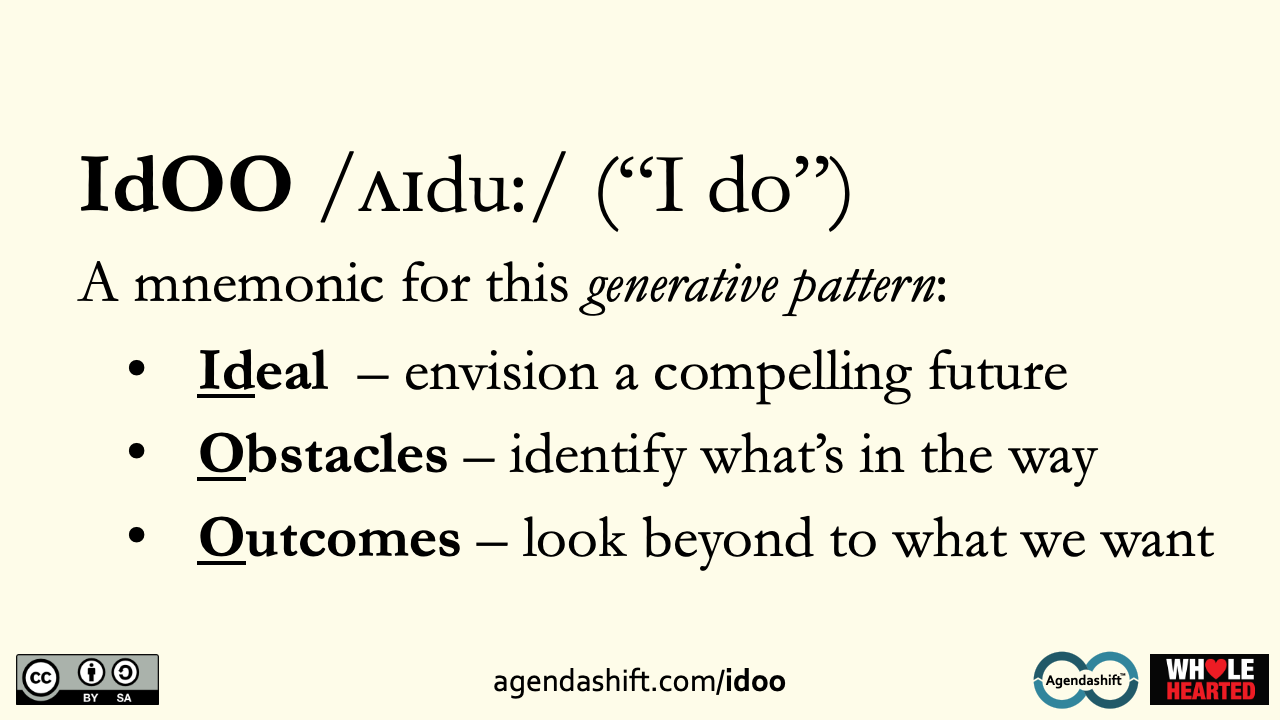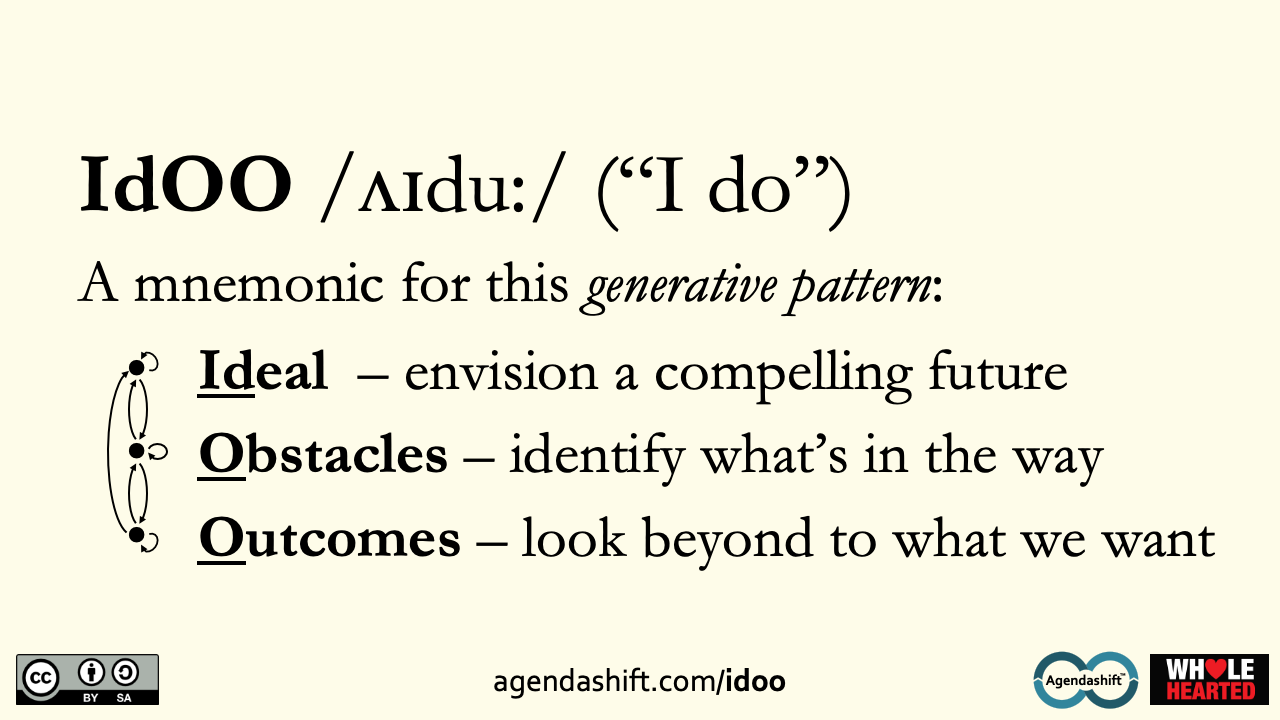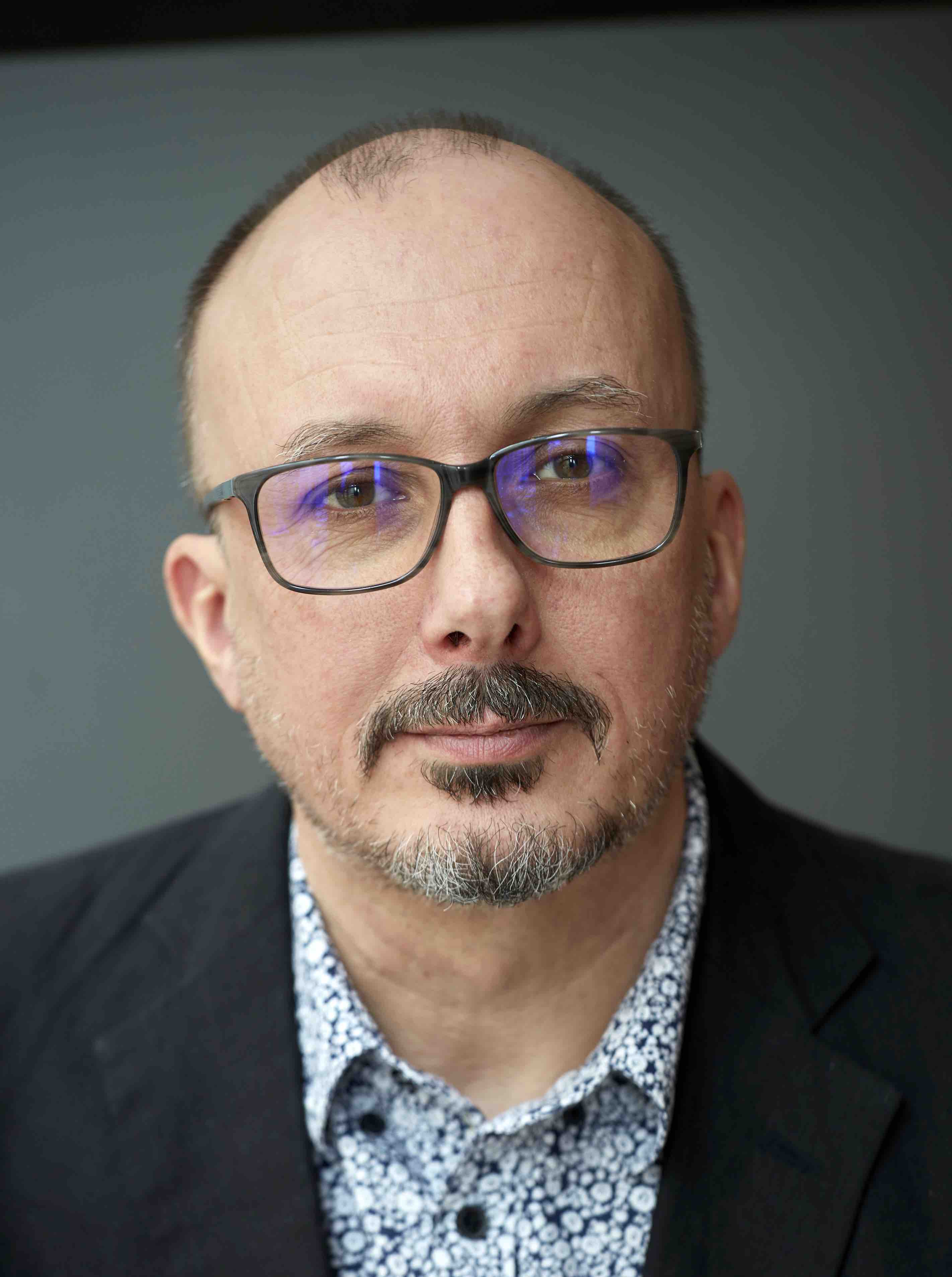We help leaders and engaged others speak the modern language of strategy – the language of needs, obstacles, and outcomes – as they engage with the right challenges, invite others into that process, and celebrate their successes. More...
Generative patterns: Ideal, Obstacles, Outcomes (IdOO)
IdOO (“I do”) – a mnemonic for Ideal, Obstacles, Outcomes – is one of three key generative patterns in Agendashift. We use the IdOO pattern at different times and with different combinations of tools and prompts, but still the underlying pattern easily recognised.
Motivation
Authentic agreement on meaningful outcomes is the most powerful enabler for strategic change that we know. IdOO promotes this by:
- Having outcomes identified and articulated through participation in a generative process, not imposed from outside
- Ensuring by construction that they are connected to needs
Specific instances of the pattern
Our transformation strategy workshops use the IdOO pattern at least twice:
- In Discovery, reflecting on our provided True North statement, in a business context established by preceding exercises (Celebration-5W in particular), and the resulting outcomes organised in a Plan on a Page
- In Exploration, reflecting on prompts prioritised from our 42-prompt assessment, context already established in Discovery, and outcomes then organised through Mapping
Our various outside-in strategy review workshops typically employ the IdOO pattern either once or twice, for combinations of the the outside-in strategy template's five layers (see OI-SR template).
For both kinds of strategy workshop, in the guise of the Meaning, Measure, Method pattern, the IdOO pattern also features in the ideation process, starting this time with the Ideal for a specific outcome selected for action.
Demonstrating IdOO at its most simple, the Agendashift True North deck asks the questions below in sequence, one slide at a time (the True North statement fulfulling the role of generative image, evoking a wide range of possible responses both spoken and unspoken):
- When this is working at its ideal best for us, what’s that like?
- Whose needs would we be meeting?
- What new stories could they tell?
- What stops that? What gets in the way?
- What would you like to have happen?
- Then what happens? (And perhaps again: Then what happens?)
Facilitating IdOO
Ideal: This is the result of the reflection (written down or otherwise) and should not be confused with the generative image, challenge, or other prompt – provided or harvested – used by the facilitator in the reflection’s setup.
Obstacles: Their elicitation is usually straightforward – from experience we have learned to use neutral but direct questioning – often as simple as “What stops that?”. In certain circumstances however it may be appropriate to employ a more elaborate obstacle identification exercise. Regardless of they are generated, it’s important afterwards to check that obstacles identify real issues and don’t suffer from certain unhelpful framings (see Good Obstacle, Bad Obstacle).
Outcomes: These can be generated by various means, for example one of the two variants of our Clean Language-inspired coaching game, 15-minute FOTO, the miracle question (Solution Focus, see below), or some combination. As already indicated, outcomes can be organised in multiple ways after generation.
IdOO is not always linear. For example, although 15-minute FOTO is mainly about exploring and developing a landscape of outcomes, further obstacles may be identified in that process, and from those, more outcomes. It could be said therefore that the process builds a fractal landscape of both obstacles and outcomes. And at any point, a new ideal can be established and the process started afresh.
The strategy 'wrapper'
Two patterns for the price of one! For best results:
- Establish context – see for example Celebration-5W
- Have the conversation(s) – IdOO-based or otherwise
- Organise the strategy – Mapping, OKR, etc, avoiding the temptation to stop at 'next steps' and losing most of what was discussed.
See also:
The classic coaching model GROW (en.wikipedia.org) – Goal, Reality, Options, Way forward. Because we are developing strategy, IdOO departs from that highly recommended model in two key respects:
- We seek to generate a landscape of outcomes – potentially a fractal landscape with further obstacles and their corresponding outcomes embedded within it – covering a range of timescales
- Rather than seeking to help the client towards their next actionable step, we go on to organise outcomes to reveal lines of sight between near-term opportunities, key results, medium-term objectives, and long-term goals; by their construction we can reasonably expect to find coherence here
From the Clean Language community, to which the Agendashift community is closely aligned, the PRO model – Problem, Remedy, Outcome (cleanlanguage.com) – by Penny Tompkins and James Lawley. The ability to recognise the differences between the three elements of the model and to move conversations between them are certainly valuable skills. Comparing PRO and IdOO:
- Problem and obstacle are similar, differing perhaps more in tone than in substance
- In IdOO, not seeking remedies at this stage, we are happy to gloss over them, replacing them with their respective outcomes (a strategy applicable in Clean Language coaching also). In Agendashift, potential solutions are considered later in the process, often loosely held as hypotheses and experiments. See Agendashift’s other key pattern, Right-to-Left Strategy Deployment.
- Outcomes in the two models are the same.
Curated lists of Clean Language questions (reesmccann.com) and translations (cleanlanguage.co.uk). Our Clean Language-inspired coaching game 15-minute FOTO is available in multiple languages also.
The miracle question (Solution Focus): See en.wikipedia.org/wiki/Solution-focused_brief_therapy#The_miracle_question and The Solution Focus, Paul Z. Jackson & Mark McKergow (Nicholas Brealey International, 2011)
Further to the above, Practice Outcomes, aka 5% Outcomes, 15% Outcomes (blog.agendashift.com), an optional warmup to 15-minute FOTO
Challenge Mapping (Sid Parnes, Min Basadur) – broadening and narrowing with Why and What, responses captured in How might we...? (HMW) form:
- “Why [is this an important challenge]?”, “Why else?”, and contextualised forms such as Why is solving this important?, Why is achieving this important?
- “What’s stopping us?”, “What else?”, etc
References:
- Reducing Complexity in Conceptual Thinking Using Challenge Mapping
Min Basadur (researchgate.net, 2003) - Challenge Mapping – a powerful method for finding the right focus
Piritta Kantojärvi (grapepeople.fi, 2017) - Challenge Mapping Part 1 - Challenge Map Basics
Jeanine Harriman (7leaguestudio.com, 2019) - Reappreciating: “How Might We?”
GK VanPatter (linkedin.com, 2015)
From the Lean community (to which we also align), some resonances with Mike Rother’s Toyota Kata have been noted. Like the katas, IdOO could be described as a ‘routine’ to be practiced.
Further reading
- Agendashift: Outcome-oriented change and continuous transformation , Mike Burrows (2nd edition 2021)
- Right to Left: The digital leader’s guide to Lean and Agile, Mike Burrows (2019, audiobook 2020)
Copyright © 2015-2026 Agendashift Ltd (formerly Positive Incline Ltd). All rights reserved. The page Ideal, Obstacles, Outcomes (IdOO) by Mike Burrows of Agendashift Ltd is licensed under the Creative Commons Attribution-ShareAlike 4.0 International License. To view a copy of this license, visit https://creativecommons.org/licenses/by-sa/4.0/.
Source text maintained at github.com/asplake/agendashift-open/tree/master/framework/patterns/idoo.md (github.com)
For image source files (or simply to join the Agendashift mailing list), just ask:
I understand that I will be joining the Agendashift mailing list also
Related
-
Agendashift as framework
- Agendashift’s generative patterns
- Ideal, Obstacles, Outcomes (IdOO)
- Right-to-Left Strategy Deployment
- Agendashift's five core activities
- Models, sources, and inspirations
- Our mission: Wholehearted
- Agendashift Assessments and Free 14-day trial
- Events calendar – training and other events
- Subscribe
Meet us online
- Subscribe (up to 5 emails per month)
- Read our blog: blog.agendashift.com
- Join Agendashift on Slack
- Join our LinkedIn group: Agendashift
About us
Agendashift™ is brought to you by Agendashift Ltd (formerly Positive Incline Ltd), UK-based specialists in leadership, engagement, strategy, and change. Founder Mike Burrows came to prominence in the Lean-Agile community as the originator of Kanban’s values model, out of which came his first book, Kanban from the Inside (2014). His more recent books Agendashift (2nd edition 2021) and Right to Left (2019) bring a resolutely needs-based and outcome-oriented perspective to change, transformation, and the Lean-Agile landscape as a whole, contributing meanwhile a number of popular tools, games, and other resources. He works as a consultant, facilitator, and trainer, and as a keynote speaker at events public and private around the world.
Copyright © 2015-2026 Agendashift Ltd (formerly Positive Incline Ltd). All rights reserved. Privacy, security, and usage policies



